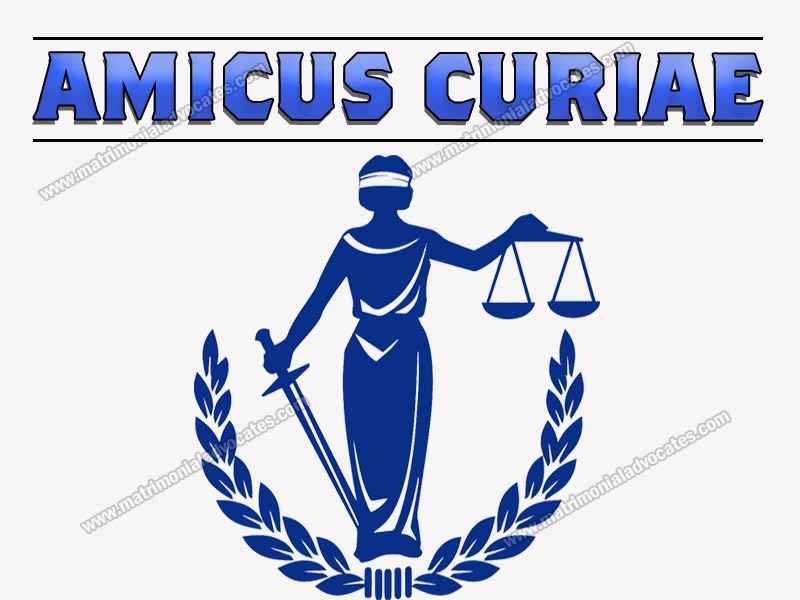
what is amicus curiae.
ans- Amicus Curiae is like a formal friend of the court, who assists the court like an expert.
Amicus curiae appointed by the court for getting the expert advice on any case or any legal point of view.
Amicus curiae assist the court in a very well manner and further providing the information, related to any issue where the court stuck in any case.
Here we need to understand that amicus curiae is not a party of the case but has a strong interest in the matter, they appointed for the expert advice or to solve the case.
When the issue arises before any court or the court unable to find the solution in that case the court can call the amicus curiae the expert friend of the court. The amicus curiae have power to solve the issue by focusing on it or by taking the time.
That the amicus curiae submit a brief in the case with the goal of influencing the court‘s decision. Such briefs are called “amicus briefs.”
Amicus briefs are the legal documents filed in appellate/apex court cases by the person i.e. non-litigants with a strong interest in the subject matter. The briefs advise the court of pertinent, additional information or arguments that the court might wish to consider.
That the amicus curiae volunteers helps or provide the information on a point of law or some other part of the case to reach out the court in finalizing a matter before it
The person who appointed by the court, to assist in certain technical matters this person will be a professional/skilled in one of the relevant fields (including legal issues) for the litigation and cannot be a party to the case.
The permission given by the court to recommend it in high opinion to some matter of law that directly affects the case in question.
SOME JUDGMENT WHERE THE ROLE OF AMICUS CURIEA WORKS AS EXPERT.
IN Vineet Narain & Others vs Union Of India & Another on 18 December, 1997 the appointment of amicus curiae in this case to provide assistance to the court on legal issues: exercising supervisory jurisdiction to monitor implementation (, and delivering detailed directions to the executive and formulating guidelines to fill a legislative vacuum on the issue of public corruption. This case created public awareness regarding the issue of corruption, and inspired people to engage with the judicial system through the process of public interest litigation
In the case SHAIK MUKTHAR vs. State of AP, the Hon’ble Supreme Court has given a judgment stating that if an accused is not represented before any court of law, it has either to appoint an Amicus Curiae or refer such matter to the Legal Service Committee demanding them to appoint an advocate for the same.
That in Nirbhaya Gang Rape Case, 2002 Gujrat riots case, Novartis vs. Union of India &ors, 2G Spectrum Case, in all of those cases advocate appointed as “amicus curiae” to represent the respondent/accused.
In the case of Md. Sukur ali v. State of Assam, for several reason the advocate for the accused did not appeared before the court of law, and so one significant question that put down before the court was whether they could appoint an amicus curiae for the purpose of defending the accused.
Appointment of amicus curiae in family court
According to the section 13 of the family court ;- Right to legal representation.-Notwithstanding anything contained in any law, no party to a suit or proceeding before a Family Court shall be entitled, as of right, to be represented by a legal practitioner: ” Provided that if the Family Court considers it necessary in the interest of justice, it may seek the assistance of a legal expert as amicus curiae.
Via section 13 of the family court act the court can appoint amicus curiae for any expert advice.
SUPREME COURT GUIDELINES FOR THE APPOINTMENT OF AMICUS CURIEA
- In all cases where there is a possibility of life sentence or death sentence, Advocates who have put in minimum of 10 years practice at the Bar alone be considered to be selected as Amicus Curiae or throughout legal services to stand for an accused.
- In all matters dealt with by the High Court regarding confirmation of death sentence, Senior Advocates of the Court should be considered firstly for appointed as Amicus Curiae.
- Whenever any counsel is appointed as Amicus Curiae, some reasonable time may be provided to facilitate the advocate to get ready for the matter properly. There cannot be any hard and fast rule in that behalf. However, a minimum of seven days’ time may normally be considered to be appropriate and adequate.
- Any counsel, who is chosen as Amicus Curiae on behalf of the accused for representing him should normally be authorzed to have meetings and conversation with the concerned accused.





